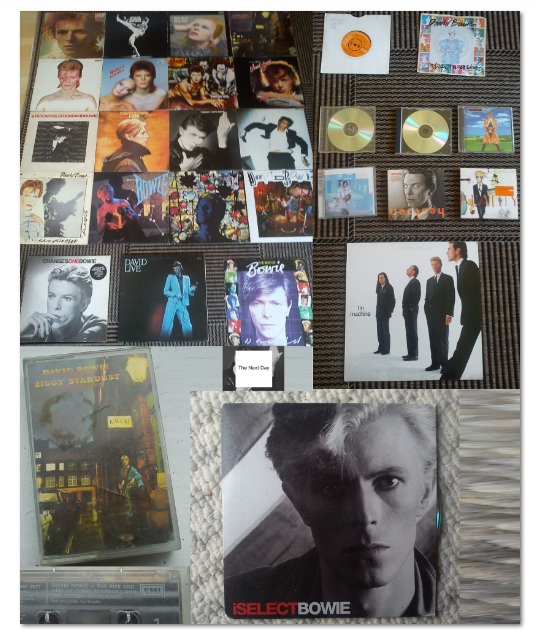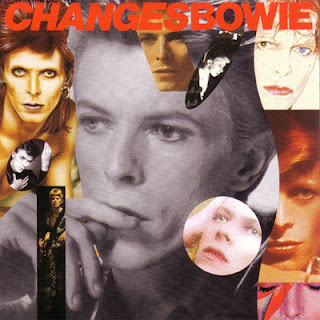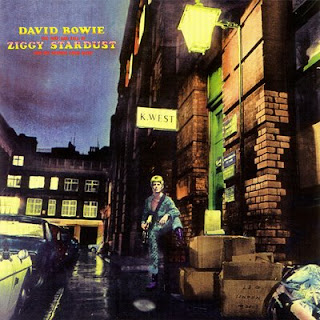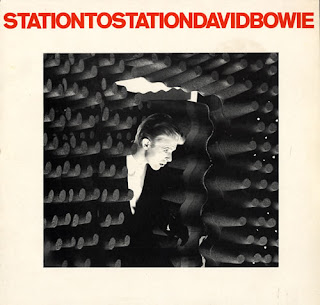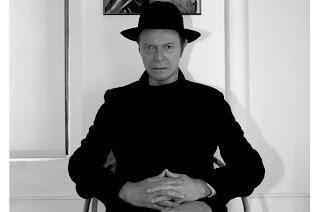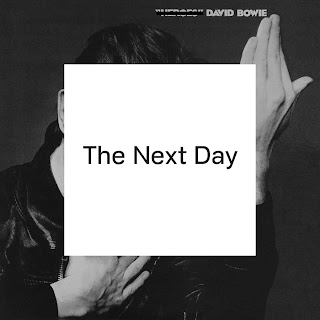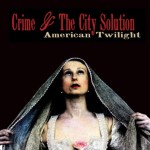It’s a great pleasure to be contributing towards Bowie Month on God Is In The TV, and it’s been equally enjoyable reading some of the other contributions from my fellow writers. Dominic Valvona‘s input has been terrific, and there have also been some rather brilliant articles from Sean BW Parker and editor Bill Cummings. There’s more to come too, including our exclusive Bowie covers compilation ‘Ashes To Ashes’, featuring a range of excellent bands and artists.
But now for an open love letter from me to my idol. Join me as I worship at the altar of Bowie.
David Bowie is the artist who played the most influential role in my early musical life. Those who regularly read my weekly RW/FF column may know the story of how my childhood was spent listening to mostly rubbish. Then I discovered Bowie, who set the standard. Of course The Beatles and Blur also played vital roles in shaping my tastes, but the moment I truly got into Bowie was the moment that I knew that music was always going to be my favourite thing. It was after seeing him perform on TV at the 1992 Freddie Mercury Tribute Concert that I became immediately intrigued by this man. In those days Queen were everywhere in the wake of Mercury’s death, and ‘Under Pressure’ became my favourite Queen song. But it was soon to become exactly what it is to me now: a song that Bowie made with Queen.
It was at some point in about 1993 that I began really taking an interest in his extraordinary music, and by 1994 he was my hero.
My Mum owned a few Bowie LPs and a cassette of the excellent ‘Changesbowie’ compilation, and it was that tape which provided me with a priceless musical history lesson. My Dad’s friend John was also a Bowie fan, and after he lent me a video of ‘The Singles Collection’, I became fascinated with the ever-changing image and the ever-evolving music. The videos highlighted the way he was constantly moving forward in terms of style, at times it seemed hard to believe this guy strumming ‘Space Oddity’ was the same man in the lime green suit who dropped to his knees and recited the lord’s prayer at the Freddie Mercury Tribute Concert.
And the first record I can remember buying for myself? A 7″ picture disc of the ‘Fame’ 1990 reissue. This was followed by me borrowing various Bowie albums from the local libraries and recording my own copies onto C90 cassette tapes. Of course the one that stood out most back then was ‘Ziggy Stardust’, a completely and utterly thrilling album with an eternal place in history. The electrifying glam anthems seemed to immediately embed themselves in my mind, while the more subtle moments taught me how to listen to music in a more thoughtful way and appreciate it on an emotional level. It was so good that after I heard it, music was always going to be my favourite thing. These songs made me feel so overwhelmed by their power that they made me start hearing things in a different way, and by 1994 music had well and truly become “my thing” (after brief childhood interests in clocks, dinosaurs and stamp collecting).
After that, I began sitting downstairs in front of the hi fi with the headphones on, listening to my Mum’s vinyl copies of ‘Hunky Dory’, ‘Aladdin Sane’ and ‘Diamond Dogs’. But perhaps back in the 90?s I was too young to really understand what those albums were about and where they were coming from musically, not to mention lyrically. Perhaps back then, the familiar hits were having such an effect on me that I wasn’t really listening properly to everything else. Plus back then his most recent album was ‘Black Tie White Noise’, which I found to be rather boring at the time and nowhere near as thrilling as the Bowie I knew and loved. I think differently of it now though.
Back then I was under the impression that the records he released from 1971 to 1974 were the main ones that needed to be heard. That changed when I bought a cassette of ‘Station To Station’ from the HMV in Bristol. The opening title track was an extraordinary mini opus that took my ears on a journey, a paranoid multipart groove that was one of the most infectious things I had ever heard. The music on that record taught me yet another side to Bowie, and despite being only six tracks long, it delivers more than enough in terms of essential music. It’s a masterpiece, and that’s a fact.
But over the years I have come to realise that ‘Low’, ‘Diamond Dogs’ and ‘Heroes’ are all equally as fantastic. In recent years it has been the legendary Berlin trilogy that I’ve been listening to the most, maybe because it’s a case of making up for lost time. It took me until 2009 to add those albums to my collection, or even hear them in full. Why did it take me so long? Maybe because I found it hard to believe that ‘Low’, ‘Heroes’ and ‘Lodger’ could top my favourite Bowie records, and I already owned what I thought to be the essential tracks from them. But yet again, these records held plenty of surprises and otherworldly sounds. These songs didn’t sound anything like he’d done before, yet the way they were put together could have only been done by Bowie. ‘Low’ in particular is monumentally brilliant, just take a listen to side two to hear the blueprint for ambient music many years in the future. It’s all there. Some people still don’t rate ‘Lodger’, but I’m one who thinks it’s a fantastic piece of work, although it falls slightly short of its two classic predecessors.
During the mid 90’s, it was all about Britpop, and Bowie’s influence on that whole scene was absolutely pivotal. Just listen to Suede, Blur and Oasis. It’s obvious that they had all learned from him. Listen to Blur’s ‘All Your Life’, and you’ll hear a sequel to ‘Oh You Pretty Things’. As for ‘M.O.R’, its blatant similarity to ‘Boys Keep Swinging’ meant that Bowie had to given a writing credit.
But by this point I was fascinated with this absolute polymath. Not only did I recognise Bowie as a genius, but I was convinced that he had some sort of superhuman ability to create magic through music. I became so fascinated with him that I even sat down to watch the whole series of ‘The Buddha Of Suburbia’ just to hear Bowie’s soundtrack. I didn’t have a clue what was going on, I just waited patiently to catch the occasional sound of my idol. Because of it not being widely available at the time, I didn’t own the soundtrack album back then, in fact it’s only over recent years that I’ve given it a listen. It’s a fantastic record too, bridging the jazzy hip hop sounds of ‘Black Tie White Noise’ with instrumental ambient soundscapes that recalled the Berlin-era, and hints of industrial rock. It’s an overlooked diamond in Bowie’s catalogue.
His next album ‘Outside’ was to be an even further departure, and was also completely at odds with ‘Black Tie White Noise’, offering bizarre between-song narratives, harsh industrial textures, heavy moods and bursts of free-jazz oddness. It received a mixed response at the time, but now it’s regarded in some quarters as an underrated classic. I didn’t own a copy of ‘Outside’ back in 1995, but for Christmas that year one of my presents was ‘The Heart’s Filthy Lesson’ CD single. By this point I was a very young resident DJ at the club my Dad managed in Corsham, which involved spinning lots of dance tracks and floorfillers. But Bowie even managed to find his way into that, as a Pet Shop Boys-featuring remix of ‘Hallo Spaceboy’ gave him a crossover hit, one which became a nightly fixture during my DJ sets. I’ll never forget the sight of that bright pink 7″ single spinning round on the decks. Great times.
Another notable memory I have from that period was belting out ‘Modern Love’ at a karaoke night that took place at the club. Some will disagree, but I still think that’s a great song.
Soon he would even dabble in jungle and drum n bass with the ‘Earthling’ album. He could do anything. And the best thing is he wasn’t ever trying to jump on a bandwagon, more a case of using elements of a certain genre and completely stamping his own imprint all over it. Whether it was industrial metal, soul, jazz, dance or jungle, it seemed that any genre could be successfully Bowie-ised.
For sure Bowie’s constant reinvention could be as confusing as it was refreshing, but overcoming the confusion was part of the enjoyment as soon as you understood where the music was coming from. His lyrics often leave themselves open to how people perceive them, but only Bowie knows the full ins and outs of each line and their subtle historical and literal references, plus the lyrical imagery and masked metaphors that make the listener wonder just what was going on inside the author’s mind. It’s also fascinating when you notice how he channelled his art through different characters, and the effect this method had on the music. In his legendary Ziggy creation he had spawned a persona so powerful that it was threatening to completely overcome his natural self. But the other characters he morphed into over the years were carefully controlled by Bowie’s mind, a place where detail has always been important.
The greatest solo artist of all time? I’d so say. Some people used to call Michael Jackson the king of pop. Bowie was the king of everything, and still is.
And despite all those timeless landmark records, not one album comes close to truly DEFINING Bowie. Of course ‘Ziggy Stardust’ is utter genius, and it does a perfect job of capturing the man at the peak of glam rock, but it doesn’t even hint at the bleak electronics and symphonic coldness of ‘Low’, the joyous white soul of ‘Young Americans’ or the tortured and mysterious ‘Station To Station’. Even the best of the many ‘Best Of’ compilations sound like incomplete pictures. The fact is that to truly understand Bowie you need to hear the whole album collection in chronological order… This is a man whose career has been too diverse and prolific to possibly sum up with one single album, or even a 2 disc collection.
One thing that never fails to surprise me is how years later i am STILL discovering new magic in these albums… It seems that the lesser known tracks I wasn’t so keen on when I was young sound utterly mind-blowing now. Maybe it’s because I’ve become too over-familiar with the likes of ‘Starman’ and ‘Ashes To Ashes’ that I seem to find more pleasure in the more unfamiliar tracks. But having said that there are many Bowie songs I could listen to a hundred times a day and still NEVER get bored of.
In February 2012 I published an article celebrating Bowie’s career on his 65th birthday. But there was still no sign of the man stepping back into action: “Nobody really knows whether Bowie will return to recording and performing, in fact last year his official biographer reckoned he had ‘retired’ to spend his remaining years catching up on what ‘normal’ life is like. Hard to believe when you think of the constant musical mission Bowie has always seemed to be on.” At the time I thought that perhaps after spending most of his life on that mission, he’s realised that forever changing the face of music was enough for him. Now he could sit back, relax and live the rest of his days beaming with pride as he watches over the many generations of musicians who he helped create. “But whatever happens Bowie has already left behind a legacy as great as any, and those incredible songs will live on forever…”. I didn’t think that exactly a year later he would announce the surprise release of a brand new album.
‘The Next Day’ is an incredible and thrillingly diverse collection of tracks that prove this legend STILL has plenty more to offer. He is an artist who doesn’t deal in nostalgia, yet he is well aware of how the past haunts the present. And he’s made an album about it. Genius. Right from the opening track he sounds alive, hungry and reinvigorated. This is not the sound of a frail old man with nothing left to say. In fact the 66 year old Bowie has more to say than the vast majority of artists many years younger.
Well, if anyone’s going to show ‘em how it’s done, then it might as well be the king himself.
A portion of my recent review reads: “Not only the album Bowie fans have been awaiting for a decade, but the return to form that a lot of people thought would never happen… He doesn’t ever sound like a “museum piece” over the course of these 14 tracks, in fact he sounds more hungry and more relevant than he has done for decades.
To say it’s a pleasure to have him back would be an understatement.”
Amen to that.
I have to thank him for influencing me, and for inspiring all the other bands and artists who have also influenced me. And most of all I have to thank him for the phenomenal music. Without him, I probably wouldn’t be doing what I’m doing today. David Robert Jones, I salute you.

